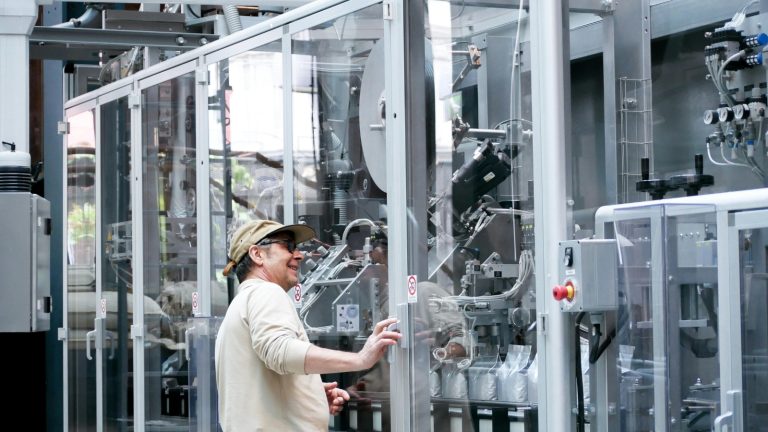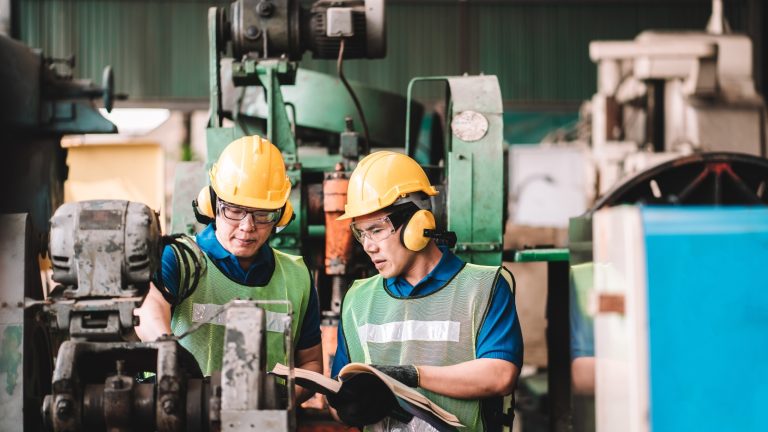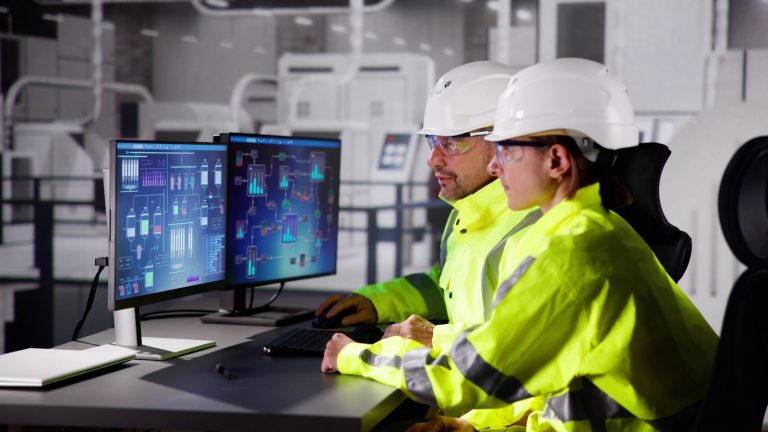A production operator’s job is considered to be one of the most demanding positions all around the world, especially in top manufacturing countries such as China, Japan, Singapore, the United States, etc. Although almost every job is at a high risk due to Artificial Intelligence, production operator skills and responsibilities cannot be conquered easily by any technology in the near future.
Looking into the job market and the industrial world, what we can see is that many people are still confused about the boundaries of this role, the typical operator job description, and what it means to consistently meet production targets.
A production operator is a key professional in the manufacturing industry who ensures that production processes run smoothly. When people ask “what is a production operator job”, it simply means managing the equipment, quality checks, and coordination required to keep a production line efficient. The production operator role remains one of the most essential in manufacturing, calling for individuals who are both detail oriented and skilled at process improvement.
Exploring the Production Operator Meaning:
The term production operator refers to a person responsible for operating, monitoring, and maintaining machinery or processes that transform raw materials into finished goods, while also helping to maintain accurate records and uphold quality standards throughout the manufacture process.
In this article, we answer the question ‘what does a production operator do’, exploring its responsibilities in depth and providing a thorough job description.
What Does a Production Operator Do? (Role, Meaning, and Job Definition)

If you are wondering what is a production operator, it is a professional who manages the daily functions of production lines, ensuring that machinery, people, and materials operate in harmony. The operator in production ensures efficiency and quality throughout every manufacturing stage, playing a pivotal role in process improvement and maintaining accurate records.
- A production operator is who oversees a line of assembly and equipment that performs various manufacturing functions. They ensure their team members meet production targets on the assembly line, such as generating a specified quantity of finished products during their shifts. They frequently work on the production floor to ensure that all stages of the manufacturing process are flawless and meet product quality standards.
- Production operators have to engage with engineers and quality teams to improve workflows in addition to overseeing equipment and procedures. They pinpoint places where processes may be optimised, such as cutting waste or speeding up cycle times, which boosts manufacturing line efficiency and helps meet production targets. Being detail-oriented and having basic computer skills are essential for tracking and maintaining accurate production records.
- If we look into a production floor, we can see that numerous operators also offer insightful opinions derived from practical experience, making them essential to efforts for ongoing development. When looking into the prime focus of the production operator duties, we can see that they require technical knowledge, problem-solving abilities, and attention to detail to ensure the factory meets deadlines while not keeping any room for quality breaches.
What Are the Responsibilities of a Production Operator?

Role of an Operator in Production
The operator in production simply walks onto play a central role in coordinating machinery, monitoring workflow, and guaranteeing quality standards.
Their duties are both technical and supervisory, bridging the gap between engineering design and actual manufacturing execution.
The job description for a production operator often involves collaboration with team members, recording accurate records, and optimising the manufacture process to meet product goals efficiently.
So, yes, these operators function as a structural pillar in the manufacturing process since they simply authenticate high-quality items before the production deadline. The kind of products the organisation produces determines the jobs that operators must do. The following are some typical duties of a production operator:
Oversee Machineries
It goes without saying that production operators are responsible for keeping machinery and production equipment in working order. Let’s explore how they do it:
- Regular Checks: Operators inspect machines and production equipment, listening and watching for anything unusual. If something seems off, they make adjustments.
- Maintenance Schedules: They create cleaning and maintenance plans to prevent problems in the factory and uphold safety standards.
- Seeking Help: If a task is too complex, they work with internal maintenance teams, other machine operators, or outside experts.
- Early Detection: By noticing small mechanical issues early, they prevent them from becoming costly breakdowns that could hinder meeting production targets.
- Digital Monitoring: In modern factories, operators often use digital systems that require basic computer skills to track machine performance and spot potential problems.
- Safety First: This proactive approach not only keeps things running smoothly but also reduces the risk of accidents by adhering to safety standards.
Their careful attention ensures that equipment is reliable, efficient, and helps meet production targets. Therefore, this responsibility shows how vital an operator in production is to the continuous performance of factory machinery across fast-paced environments and assembly lines.
Examine and Validate Completed Goods
Did you know that the key responsibility for all production operators, from entry-level to experienced, is quality control inspecting and ensuring finished products meet required quality standards? They must check that all products meet the customer’s requirements, maintaining the company’s reputation and adhering to the highest quality standards throughout the entire manufacturing process.
Checking for Quality:
Operators are the ones who inspect goods for any flaws and maintain accurate records. If they find a problem, they must fix it right away. This process involves more than just looking at the product. Operators may also use measuring tools, testing equipment, or computer systems to check a product’s size, strength, or performance.
This careful inspection and maintaining accurate records helps maintain the company’s reputation and reduces customer complaints and recalls.
Improving the Process:
Another fact is that operators record their inspection results, providing valuable data that can be used to improve the production process and contribute to process improvement. By working with quality assurance teams and team members, they create a feedback loop that leads to better finished products and happier customers. This makes their operator job vital in building trust and reliability in the company’s products.
No need to mention that these duties are central to a production operator’s job in any manufacturing industry. Understanding these responsibilities highlights the technical and strategic importance of the production operator position and ensures each machine operator is contributing to meeting production targets.
Understanding and Adhering to Deadlines
As one of the main responsibilities, these production operators are responsible for meeting production deadlines set by the company, as outlined in their operator job description. This requires them to be highly organised, maintain accurate production records, and have excellent time management skills.
One of their main tasks is to ensure that machines and assembly lines are running smoothly and efficiently, which reduces downtime and keeps production on schedule.
Not to mention that they also play a key role in identifying any issues or delays in the manufacturing process and finding solutions to keep things moving. This may involve adjusting machine settings, troubleshooting technical problems, problem-solving on the fly, or coordinating with other departments to resolve any bottlenecks.
In addition, production operators must prioritise tasks based on urgency and communicate effectively with supervisors and team members to ensure everyone is working toward the same goal of meeting deadlines and ultimately meeting production targets.
Ensure Quality
We all know that manufacturing companies offer their products to make money. The first step to gain profits is adhering to the deadlines. This role enters the manufacturing process to ensure the workers are aware of the deadlines and adhere to them accordingly while maintaining accurate records and upholding quality standards.
Production operator responsibilities extend toward the requirement to collaborate with relevant suppliers and vendors to keep the raw materials coming to the warehouses on time, which is vital for the assembly line and producing finished products efficiently.
Also, there are rare circumstances in which supply chain disruptions or machine failures cause unexpected delays in schedules. In such events, production operators must be able to modify procedures, showcase process improvement skills, and adjust setup operations to align with the promised deadline. This means that this role requires people who can work under stress, be detail-oriented, and prioritise work above all else.
Communicate with Executives and Supervisors
It is a common practice that production operators report to supervisors. Supervisors need daily activity reports that highlight:
- Any issues that could reduce assembly line productivity in fast-paced environments.
- Achievements of performance goals or meeting production targets.
- Concerns or problems that arise affecting quality standards.
This proactive reporting helps management identify potential roadblocks early, allowing them to implement safeguards to keep production on track and prevent delays while maintaining accurate records.
These reports should include key performance indicators (KPIs) such as:
- Manufacturing output
- System-level service disruptions
- Rates of quality defects and results from quality control inspecting
These KPIs offer two main benefits:
- Valuable business insights for stakeholders to make informed decisions and improve the manufacturing process.
- Aid management in distributing resources and improving processes efficiently, supporting continuous process improvement.
It is an established fact that operators use their communication skills to bridge the gap between strategic planning and frontline operations. Effective reporting fosters openness and accountability, ensuring all departments and team members are aligned.
This need for clear communication underscores why production operator roles and machine operators require both technical expertise and strong teamwork skills in fast-paced manufacturing environments and on the assembly line.
Maintain a Safe and Secure Environment?
While many assume a production operator’s main focus is on productivity and deadlines, adhering to safety standards and maintaining a secure environment is their number one priority. A factory floor contains large, powerful machinery and advanced production equipment, and operators must ensure the company follows all safety regulations and government standards outlined in the operator job description.
Key safety practices include:
- Maintaining a Clean and Safe Workspace: Operators are responsible for keeping work areas free of hazards. This involves looking for loose chips, potential falling items, slippery floors, and other safety risks. They also post warning signs to alert others and may replace equipment that poses a danger, ensuring safety standards are met throughout the entire manufacturing process.
- Wearing Proper Gear: Donning the correct personal protective equipment (PPE) is a critical part of the job description for every production operator and machine operator.
- Participating in Safety Training: Operators regularly take part in safety drills and training sessions to stay updated on emergency protocols. This proactive engagement helps reduce workplace incidents, maintain regulatory compliance, and avoid costly legal penalties, highlighting the importance of adhering to safety and maintaining accurate records of incidents or improvements.
This is one of the most overlooked yet vital production operator responsibilities. A well-trained operator in production understands that ensuring safety standards is just as critical as maintaining output efficiency and meeting production targets.
Today, many production operators use advanced software to manage and monitor these responsibilities, simplifying their jobs and using automation to enhance factory efficiency. These tools are especially helpful for keeping accurate records and supporting process improvement in fast-paced environments.
Streamline Production Operator Job with New Tools

Why would you let your operators worry about the production floor operations when you can help them provide extra help? The new tools are there to be utilised wisely, streamline work and gain more profits ultimately. Keep one step forward and achieve the best outcome, especially by training your team in basic computer skills.
These technologies empower every operator in production to focus on what truly matters—maintaining product quality, safety, and efficiency without delays. They make it possible for machine operators to better track assembly line progress, support quality control inspecting, and manage setup operations more accurately.
How Can the Cerexio Help with Production Operator Jobs and Duties?

Cerexio offers an Industry 4.0-driven Production Order Management System to streamline production operator responsibilities with ease. Since our solution can virtually represent the whole production floor, it will be a great pillar for the operators to screen for inefficiencies, identify errors, spot potential delays, generate reports, maintain accurate records, and customise production all under one space—enabling teams to meet production targets, synchronise team members, and improve the manufacture process.
FAQ about Production Operator Job
A production operator’s primary duties include operating and maintaining machinery, monitoring production processes, and conducting quality control checks. They ensure the production line runs efficiently, adhere to safety protocols, and work with the team to meet output targets and quality standards.
Key skills include strong technical aptitude for operating machinery, keen attention to detail for quality control, and effective communication for teamwork. Problem-solving abilities and a solid understanding of safety procedures are also vital for success in this hands-on manufacturing and production role.
Production operators typically work in manufacturing plants, factories, or warehouses. The environment can be fast-paced and may involve exposure to noise, machinery, and varying temperatures. Adherence to strict safety protocols is essential to ensure a secure and productive workplace for everyone.
A high school diploma or equivalent is typically the minimum requirement. While a degree isn’t always necessary, employers often favour candidates with vocational training, technical certifications, or prior experience in a manufacturing environment. On-the-job training is also very common in this role, ensuring that machine operators are well-versed in handling production equipment.
Production operators often face challenges like maintaining focus during repetitive tasks, meeting strict production deadlines, and quickly troubleshooting equipment malfunctions. They must also adapt to changing technologies and adhere to rigorous safety standards in a physically demanding, fast-paced manufacturing or production environment.
With experience and additional training, production operators can advance to roles like production supervisor, quality control inspector, or maintenance technician. Many also move into specialised positions such as CNC machinist or process engineer, leading to increased responsibility and higher earning potential within manufacturing.
Safety is paramount because operators work with heavy machinery and in potentially hazardous environments. Adhering to safety protocols prevents accidents, protects worker well-being, minimises equipment damage, and ensures smooth, uninterrupted production, which is crucial for overall operational success and compliance. Maintaining accurate records of incidents and improvements is a key part of the operator job description.
